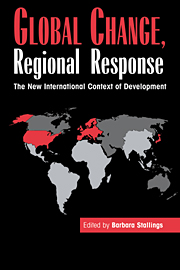11 - The new international context of development
Published online by Cambridge University Press: 05 June 2012
Summary
This book documents two sets of interrelated changes that have taken place since the early 1980s. One resulted in a dramatic transformation of the international political economy. The political divisions of the world shifted significantly, while economic interdependence increased sharply. The second led to a rapidly growing differentiation among third world countries. The average per capita GDP of the East Asian newly industrialized countries (NICs), for example, now exceeds $8,000, more than that of some European nations. At the opposite extreme, per capita GDP in Sub-Saharan Africa is only around $300, and it has been shrinking for more than a decade. Indeed, the differences are now such that the composite term “third world” has become an anachronism.
The aim of this final chapter is to suggest an approach to specify the causal relationships between the international changes and third world performance. It centers on the role of geography and regions. “Region” is admittedly a vague concept; the geographic boundaries of a region can be drawn or redrawn at the whim of an observer. Nonetheless, geographic location is important because it is associated with shared historical and contemporary experiences. Especially important for our purposes here are links with external actors and processes. The argument is that groups of countries sharing a geographic space will be exposed to international influences through a regional prism. The result leads to characteristics that skew chances of achieving development, defined as rapid economic growth with relative equity of distribution.
- Type
- Chapter
- Information
- Global Change, Regional ResponseThe New International Context of Development, pp. 349 - 388Publisher: Cambridge University PressPrint publication year: 1995
Accessibility information
- 2
- Cited by

